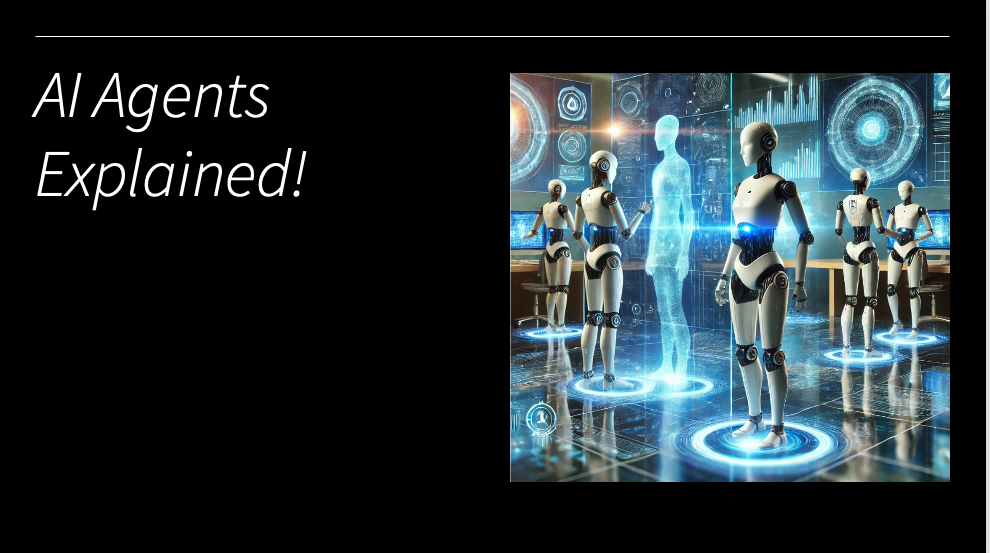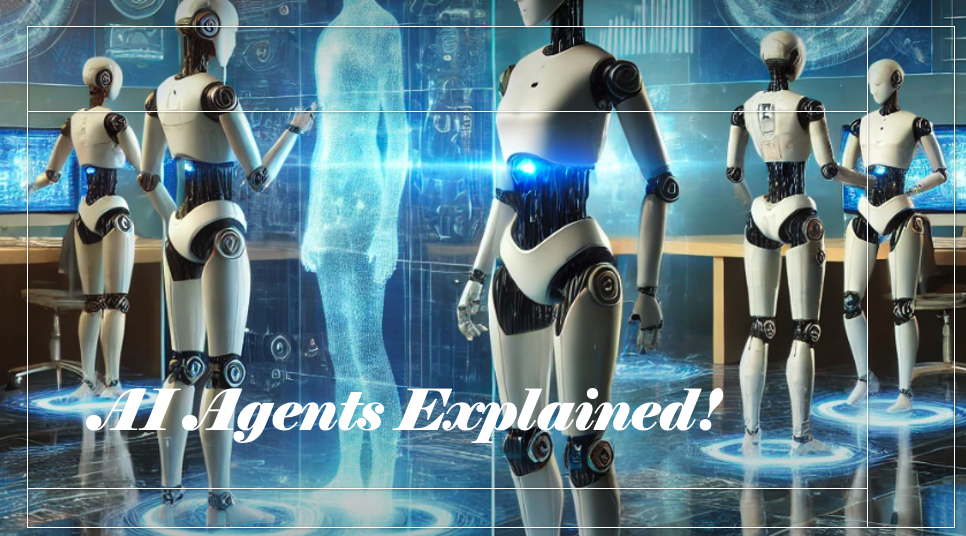AI Agents Explained: Revolutionizing the Way we Work!
Some of your colleagues may soon be AI agents. That’s what we have been told. But what exactly is an AI agent? Let’s break it down in simple terms.
What is AI Agent?
AI agents are software entities that perform tasks autonomously on behalf of users. They can process natural language, learn from data, and make decisions to achieve specific goals. These agents range from simple chatbots to complex systems capable of managing intricate workflows.
Artificial Intelligence (AI) agents are revolutionizing various industries by automating tasks, enhancing decision-making, and improving efficiency. Recent developments from tech giants like Microsoft and Google have propelled AI agents into new realms of capability and application.
Microsoft’s Advancements in AI Agents
Microsoft has been at the forefront of integrating AI agents into its products. The company introduced Copilot; an AI assistant designed to enhance user productivity across various applications. Recently, Microsoft unveiled a significant redesign of Copilot, incorporating new voice and vision capabilities to make it more personalized and interactive. The updated Copilot features a card-based interface, allowing users to engage with it more naturally. Additionally, Microsoft has introduced a virtual news presenter mode, voice interaction like OpenAI’s Advanced Voice Mode, and Copilot Vision, which can see and respond to web content users are viewing. These features aim to create a more conversational experience, with voice options and customized pages based on user history. The redesign coincides with Mustafa Suleyman, CEO of Microsoft AI and cofounder of Google DeepMind, leading the consumer side of Copilot, emphasizing a more user-focused and adaptive approach.
In addition, Microsoft has introduced the Azure AI Agent Service, a fully managed platform that empowers developers to build, deploy, and scale high-quality AI agents securely. This service simplifies the development process by managing underlying compute and storage resources, allowing developers to focus on creating intelligent agents without the burden of infrastructure management.
Google’s Innovations in AI Agents
Google has also made significant strides in the development of AI agents. The company announced Gemini, a virtual assistant that has been integrated into various devices, including Samsung’s new phones. Gemini is activated by long pressing the side button, replacing Samsung’s Bixby. This integration signifies a shift towards more advanced AI assistants capable of understanding and responding to user needs more effectively. Google CEO Sundar Pichai claimed that Gemini has surpassed ChatGPT and aims to have 500 million users by the end of the year. Gemini’s deep integration with various Google products and its easy accessibility are critical advantages. This broad accessibility could enhance its capabilities further, resulting in a cycle of increased usage and improvement. Gemini’s capability to integrate across platforms, such as changing phone settings or pulling information between apps, provides a significant advantage over other assistants. Google’s strategy mimics its previous success with search, leveraging wide distribution to quickly gather user data and improve services. Despite AI assistants still having limitations, Google’s comprehensive approach to embedding Gemini in its ecosystem positions it as a leader in the AI assistant market.
Google introduced the Vertex AI Agent Builder, a no-code platform that enables users to design, deploy, and manage conversational AI agents. This tool simplifies the creation of intelligent conversational agents and process automation, making it accessible to users without extensive programming expertise.
The Future of AI Agents
As AI agents become more advanced, discussions about their potential risks and ethical considerations have emerged. Yoshua Bengio, a prominent figure in AI research, highlighted the potential dangers of AI agents capable of acting independently from human input. He emphasized the need for strict regulations to ensure safety before developing such agentic AI models.
Despite these concerns, the integration of AI agents into various sectors continues to grow. In software development, AI agents assist in generating, testing, and debugging code, freeing developers for higher-value tasks. In healthcare, AI agents enhance diagnostics, optimize treatment plans, and alleviate workloads in under-resourced areas. AI-powered chatbots improve customer service by providing round-the-clock support.
AI agents are transforming the technological landscape by automating tasks, enhancing decision-making, and improving efficiency across various industries. With ongoing developments from companies like Microsoft and Google, the capabilities and applications of AI agents are poised to expand even further, ushering in a new era of intelligent automation

